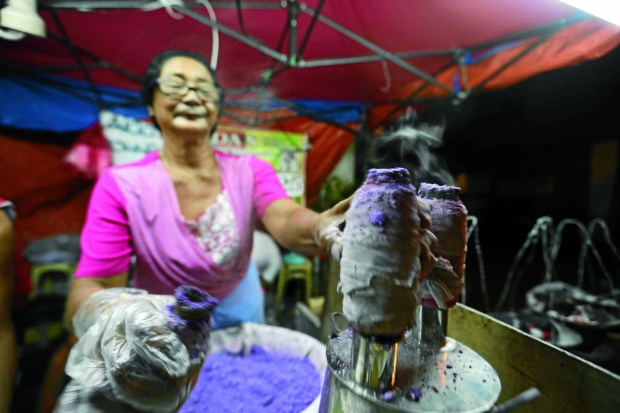
USUAL FARE “Puto bumbong” and other native delicacies are traditionally sold outside churches during the “simbang gabi.” FILE PHOTO
The Catholic Church does not see President Duterte’s war on drugs scaring people away from the traditional “simbang gabi” this Christmas.
Simbang gabi is a series of Masses celebrated at dawn for nine days up to Christmas Eve.
The Masses used to start at 4 a.m., but nowadays they are held at 5 a.m.
The novena starts on Friday.
Prayer and reflection
For Fr. Jerome Secillano, the parish priest of Nuestra Señora del Perpetuo Socorro Parish in Sampaloc, Manila, dawn Masses are a time-honored tradition that allows Filipinos to pray and reflect during Christmas.
“I think with [the war on drugs], with the killings, more people will come to church because the church and God are their refuge. I am sure more people will come to the simbang gabi, their faith will be stronger,” he said.
Secillano used the term “Oplan Tokhang,” referring to the police door-to-door campaign urging drug users and pushers to surrender, different from but sometimes the first step to the killing of drug suspects.
The killings happen mostly at night, with motorcycle-riding assailants gunning down suspects on the streets and alleys of Manila’s teeming slums.
Nearly 6,000 people have been killed since June 30, when Mr. Duterte launched the crackdown after taking office, and he has promised that more will be killed until the last drug pusher and dealer have been put away.
With almost nightly killings, no peace on Earth is expected this Christmas.
Secillano said Christmas is a celebration of life, particularly the birth of Jesus Christ.
“I think there is a contradiction, when we speak of Christmas it’s a celebration of the birth of a child, it’s a celebration of life. But then again we have a government that seems bent on imposing strategies that will cut life, that will end life,” he said.
Hope
Secillano said the Church wanted the public to be aware that life, good or bad, should be given a chance to flourish, change and be productive.
“But if one chooses to do a shortcut, then there’s no more hope for them,” he said.
Christmas, he said, is also a celebration of hope, as Jesus Christ came to liberate humankind from the clutches of sin and death.
Secillano noted that lawmakers were one step closer to their goal of reimposing the death penalty, after a committee of the House of Representatives approved the capital punishment bill last week.
Mr. Duterte has made the imposition of the death penalty a key component of his anticrime drive.
“The Church will do its mission to oppose it, but at the end of the day the Church does not vote. I think we still have allies in the Senate,” Secillano said.
Fr. Roy Bellen shared Secillano’s view, saying the Catholic faithful will still flock to churches for the simbang gabi despite death roaming the streets on motorcycles at night.
Bellen, the head of the Archdiocese of Manila’s Archdiocesan Office of Communications, said he had not seen any significant change in the number of people on the streets in the late evenings or early mornings.
“My hope is the same when the simbang gabi comes. I believe people will still be coming for the simbang gabi Masses despite these saddening killings,” he said.
“Our more urgent concern this coming Christmas season is that the value of life be upheld and protected, especially with the advent of the revival of the death penalty, to add to the killings,” he said.
The faithful, he said, should uphold the value of life and protect it, instead of being desensitized as if killings were a normal occurrence.
“Our nation is for the Filipino people, both for the good and the not so good. We have to remember that the not-so-good citizens are also victims of poverty brought about by corruption and indifference,” he said.
Bellen said the faithful should keep up their voice of defiance, lest they become accomplices to the killings because of their silence.